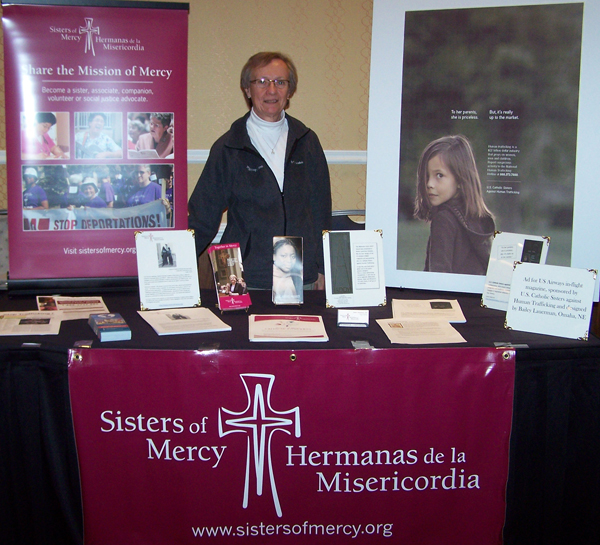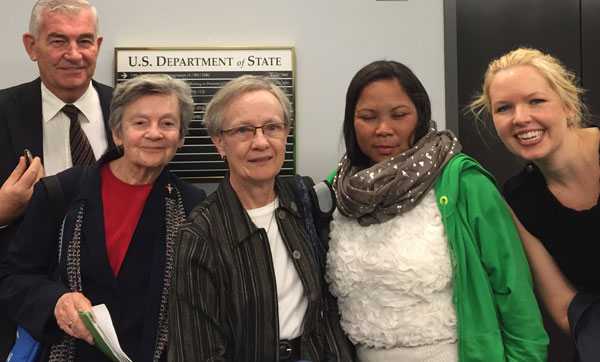Reducing Misery – Abolishing Human Trafficking
July 28, 2015
Human trafficking or modern-day slavery is the use of force, fraud or coercion for the purpose of subjection to involuntary servitude, debt bondage, or slavery.

Jeanne Christensen with the Mercy table at the Ignite Conference in St. Louis, March 2014
The two primary forms of human trafficking are sex trafficking in which persons are coerced to engage in commercial sex act and labor trafficking in which persons are forced to work against their will.
Why are we Sisters of Mercy engaged in addressing this horrendous criminal activity? We address the causes and effects of violence, racism, degradation of the Earth and injustice to immigrants and women and children. By collaborating with others to abolish human trafficking through raising awareness, providing education, advocating for policy changes and stronger legislation and providing direct services to victims we understand the interconnectedness among our five Critical Concerns and human trafficking.
As a Sister of Mercy, I have committed my life to standing in solidarity with persons who are vulnerable and suffering. After five years on the Sisters of Mercy West Midwest Community Justice Team, I knew I needed to focus on one issue and that was human trafficking. It is an extension of my advocacy for women and children -- the most vulnerable among us. To broaden and support my ministry I am a member of the U.S. Catholic Sisters against Human Trafficking, Mercy International Association’s Working Group on Human Trafficking and the Coalition against Human Trafficking sponsored by the Western Missouri U.S. District Attorney's Office
My primary work, in collaboration with others, is to raise awareness, provide education, and advocate for policy changes and stronger legislation. As an advocate, I urge members of the U.S. Congress and state legislatures to demonstrate their moral commitment to this issue by preserving and strengthening legislation that has been passed to protect and assist victims and survivors and to pass needed legislation that will punish perpetrators, never treat victims and survivors as criminals and establish severe penalties that will abolish the demand by eliminating the profit made by enslaving innocent and vulnerable persons.

L-r: Fr. Kevin Cullen (a Columban priest), Sr. Marie Lucey, OSF (Franciscan Action Network), Sr. Jeanne Christensen, RSM (Sisters of Mercy of the Americas), Marlyn Capio Richter (trafficking survivor), and Ashley Feasley (US Conference of Catholic Bishops Office for Migration and Refugee Services). April 22, 2015 in Washington DC at the US State Department meeting.
As an advocate, I also provide resources and education to others within and beyond the Mercy community that facilitate their contacting legislators and urging the passage of legislation as noted in the previous paragraph.
In addition to education for advocacy, I collaborate with others in presentations in a wide variety of settings such as parishes, women’s groups, Mercy and other religious community gatherings, other faith groups, non-profit organizations; workshops; times of reflection; guest teaching in high schools and universities or speaking informally with others. Printed materials and websites are shared as part of these educational opportunities. A major part of education occurs through electronic means such as e-lists, Facebook and forwarding or sharing information from trusted resources.
Some specific successes include:
- July 1, 2015, the Sisters of Mercy West Midwest Community received a $57,740.00 grant for “Preventing the Violence of Human Trafficking.”
- I receive many positive responses from sisters, associates and others within and beyond Mercy that provide the encouragement to “keep at it” when the work becomes overwhelming or casts long, dark shadows on a sunny day.
- I participated in an April 22, 2015, meeting with members of the State Department's Office to Monitor and Combat Trafficking in Persons. In addition to me, Sr. Denise Boyle from Mercy International and Ryan Murphy, Institute justice team member, participated. In our brief comments, Ryan, Sr. Denise and I addressed the impact that violence, impoverishment, U.S. immigration and U.S and European trade policies, and the greed of corporations and the demand for cheap products and have as causative factors in increased incidents of human trafficking.
- The US Congress passed Senate Bill 178, the Justice for Victims of Trafficking Act of 2015 on April 22, 2015.
- Also on April 22nd, I participated in a panel with Marlyn, a human trafficking survivor from the Philippines. We met with Congressional staff members to share with them the Catholic response to the tragedy of human trafficking.
o I talked especially about the response made by the Sisters of Mercy of the Americas, the Mercy International Working Group on Human Trafficking, the U.S. Catholic Sisters against Human Trafficking, Mercy Investment Services, the U.S. Conference of Catholic Bishops (USCCB), the Coalition of Catholic Organizations against Human Trafficking and Pope Francis’ Global Freedom Network
o I also noted three major health systems addressing human trafficking – Catholic Health Initiatives, Dignity Health, and Via Christi Health. The discussion was not all-inclusive of groups, systems or organizations due to time restraints.
o We emphasized that key elements of ministry in addressing human trafficking include education, awareness building, advocacy (especially legislative advocacy) and direct services. Also essential are coalition building, collaboration and networking. These occur among Catholics, faith-based and others with similar values (even if not faith-based). Included are groups, agencies, women and men religious communities, health care and education facilities and many other non-profits.
Human trafficking, illegal in every country, is the fastest growing criminal industry in the world, annually netting billions of dollars on the backs of the impoverished and vulnerable. If we turn to our Constitutions, there is no doubt why Sisters of Mercy are addressing the issue of human trafficking. 'Through direct service and through our influence we seek to relieve misery, to address its causes and to support all persons who struggle for full dignity.'
- Jeanne Christensen rsm (Americas, WMW)

